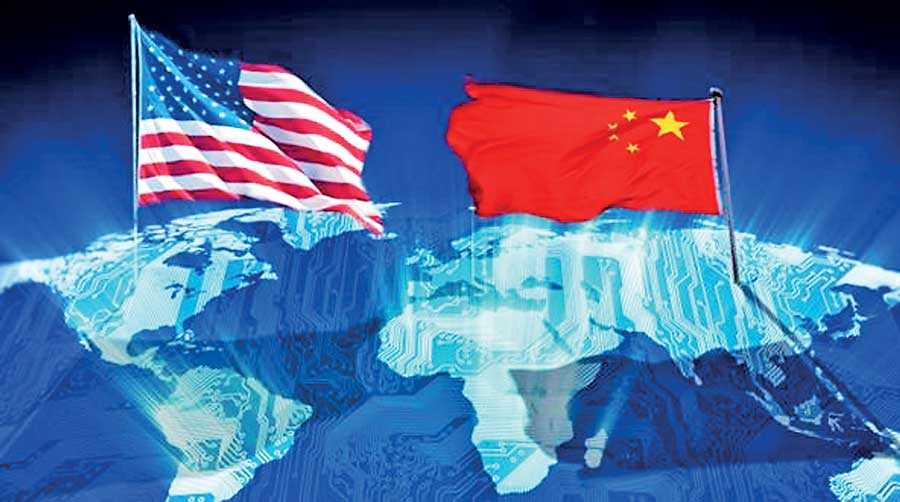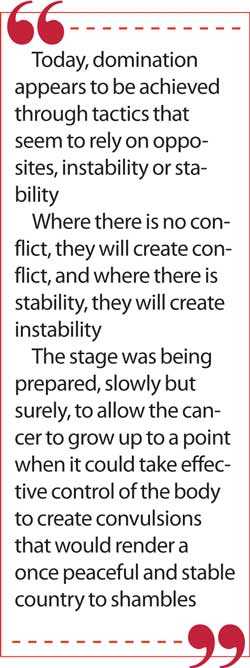Friday Feb 20, 2026
Friday Feb 20, 2026
Tuesday, 4 June 2019 00:00 - - {{hitsCtrl.values.hits}}

The undisputed current super power and the undisputed emerging super power appear to be adopting diametrically opposite strategies for the former to remain the super power and the latter to emerge as the next super power.
Aspiration towards superpower status is essentially about control of resources through different means in order to further enhance, but as a minimum, retain an existing way of life from a materialistic point of view. Power is the aphrodisiac that many leaders seek to drive them to dominate others and leaders at different levels in society acquire varying degrees of power, and the collective of these leaders are the wheels that drive a country towards a super power ambition.
Throughout history, there have been super powers relevant to the geographical and resource context of particular periods of history. Super powers have come and gone and history records their rise and fall as natural phenomena arising from human frailties of individuals and the collective. Past empires however depended on conquest and direct rule of areas conquered to sustain their status and domination.
The super powers
Today, domination appears to be achieved through tactics that seem to rely on opposites, instability or stability. The current super power, the US, uses tactics of intervention that leads to instability and domination in order to have control of resources while the aspirant, China, relies on interventions that does not create instability to have control of resources.
To add to the confusion, the US employs dual approaches where they intervene through partnerships as they do in Saudi Arabia where they do not advocate democracy as a precondition, and as they did in Iraq, where democracy was a precondition. One country is stable and the other is in chaos. China on the other hand has no preconditions relating to modes of governance and the countries where they have intervened for resources have not become unstable on their account. Why is this so and why create instability to have control of resources? Why shouldn’t partnerships be used rather than insidious underhand tactics? The experiences of Saudi Arabia and Iraq are good examples of the opposites. The Saudi royalty which thinks that allowing women to drive motor vehicles is an advancement in human rights and democracy, is partnered by the USA without any qualms about human rights violations in that country.
But, they treated Saddam Hussein and Muammar Gaddafi differently. Why couldn’t the US have a partnership with Saddam Hussein and avoid the death of a million Iraqis and the destruction of a beautiful country? Isn’t the preacher duplicitous here? Why didn’t they do the same with Gaddafi?
Perhaps there is more to this strategy than what meets the eye and besides the desire to control resources, there is another objective behind the strategies adopted.
Creating instability within a country has flow on effects within a region and onto the world at large as well. Instability invariably leads to the need to strengthen security within a country and within other countries in a region.
The question that should spring to our minds is whether there is a need to strengthen security if a country and/or a region was at peace, and therefore stable.
The world’s biggest industry, the arms and ammunition and defence/war machinery industry does not want peace. Why should a peaceful world invest in arms and ammunition and war machinery? So it stands to reason that this industry wants instability and conflict within countries and in regions for their survival and profitability.
Where there is no conflict, they will create conflict, and where there is stability, they will create instability. The greater the conflict and instability, the greater the volume of arms and ammunition and defence/war machinery sales to theatres of such conflict.
If one ponders the region that has the biggest investments in arms and ammunition and war machinery and all that is needed for ‘defence’, it is the Middle East. Why is there so much conflict in the Middle East? Simple. They have oil. The resource that is akin to Gold. If they had dates rather than oil that area would have been conflict-free.
Regional conflicts and instability precipitates countries that create these conflicts to invest more for defence in their own countries, thus providing flourishing business for companies engaged in the manufacture of such defence capabilities. So, why not create conflicts?
Current status in Sri Lanka
This brings us to Sri Lanka and the recent incidents that have escalated conflicts. From a geopolitical sense, the region encompassing Sri Lanka and India has become tense. Countries like the Maldives, Bangladesh and beyond Myanmar have become tense. China’s engagement in Sri Lanka has created tension. Why Sri Lanka? Well, we are in the Maritime Silk route, the sea corridor for China to move resources from Africa to China.
We are, along with Pakistan, Bangladesh and Myanmar, key strategic locations in this corridor and the Hambantota Port is a pivot strategic point in this corridor. If this sea corridor is blocked, China will choke as their much-needed resources will cease to each their vital industries. Who would wish to intervene in the smooth flow of these resources and create dents in China’s march towards super power status? Surely we don’t have to second guess here!
Sri Lanka has become the proverbial meat in the sandwich, or as per the pity Sinhala idiom, the ‘Girayata ahuwuna puwak gediya’. China on the one hand, the US on the other, and India as the other interested party, are pushing levers from time to time and crunching Sri Lanka, slowly but surely to keep us as a compliant minnow rather than an independent one.
In an earlier article, the author suggested that Sri Lanka should have a foreign policy based on a tri-nation compact, meaning a China, India and Sri Lanka compact. India being closer to the US than China, would keep the balance in the compact and keep Sri Lanka relatively stable, and the subcontinent region stable. An arrangement of this nature is needed in the context of the reality of tensions arising from rivalries between the super power aspirant and the current super power.
However, will such a compact ever come to pass? “Not on your nelly”, one might say, as it would be counterproductive to the intentions of the driver of all tensions and instability in the world, the arms, ammunition and war/defence machinery establishment.
The Islamic fundamentalist incursions into Sri Lanka and the recent bombings and anti-Muslim incidents have been viewed from the context of the USA’s self-interests not being heeded by Sri Lanka. A stable and China friendly Sri Lanka is not in the interests of the US. Sri Lanka should have learnt lessons from the past.
As much as India was responsible for the spawning of the Tigers and thereby the LTTE, to destabilise the country in the wake of Sri Lanka’s tilt towards the US in 1977 when India was in the Soviet Union-led socialist club, a new subcontinent order of a China/Sri Lanka strategic spot in the Maritime silk route in the Indian Ocean, was not going to be an acceptable arrangement for the US.
The script for this drama, ideal for making an Oscar-winning movie, seems to have progressed as follows. Exporting Wahhabism and even more fundamentalist Islamic practices to Sri Lanka was seen as the ideal mode of entry into Sri Lanka, allowing it to germinate and grow with fertiliser in the form of large tranches of funds from Saudi Arabia.
The first phase was to drive a wedge between Sri Lankan Muslims and Sinhalese people who got on quite well despite their differences. Many Muslim areas appeared to look like places in parts of the Middle East. Cracks were appearing in the country’s social and societal equilibrium.
Amongst the fodder for the expanding extremist cancer were the Sri Lankan minor workers employed in Saudi Arabia. The tentacles were spreading, with moles in key institutions in the country and activists, professionals and academics placed in strategic places to further the broader agenda of making Sri Lanka unstable.
Politicians were bought over and excessive powers were handed over to Muslim politicians in exchange for votes and funding for political campaigns. Vast sums of money were spent to oust a political regime and a leader, who, with warts and all, was a Sri Lankan nationalist and not a lackey of any world power.
A leader who defied the odds and gave leadership to defeat the mighty LTTE, and any intentions external powers had of controlling the country was ousted.
A simpleminded low level government official who rose up the political ladder mainly on account of his simple mind and incapability of being a threat to anyone, was hoisted to the highest position in the land in order to make sure the holder of the highest position was not a threat to the conspiracy that was being hatched and executed. The number two in the national leadership was a safe bet for the US and hence was the person needed to remove road blocks in the way of the conspiracy.
Military intelligence apparatus was decommissioned or heavily downgraded by a national leadership who were either inept or complicit or both. The cancer that was spreading went undetected although some information trickled in, but halted at the national level deliberately or through a complete lack of any sense.
What next?
The stage was being prepared, slowly but surely, to allow the cancer to grow up to a point when it could take effective control of the body to create convulsions that would render a once peaceful and stable country to shambles.
The target chosen were Catholics as an attack on them would resonate with the intentions of a global phenomenon like ISIS. A limited retaliatory attack on Muslims was stage managed as a pointer to interreligious disharmony that could get worse.
An attack on Buddhists during the first stage of the conspiracy would have deflected the international flavour that would come from an attack on Catholics. The Pope expressed his shock and horror and that made headlines. Would an attack on Buddhists have gotten internationalised?
Having achieved the first milestone in the overall strategy of destabilising Sri Lanka, an attack on Buddhists has to happen in this script in order to show total discord in the country amongst religious groups.
A country plunged into helplessness is then helped by the Good Samaritans who come in with their military and establishes themselves as the real powers behind the throne. The aspirational super power decides to cut its losses and moves out of Sri Lanka. The super power has its latest satellite. Sri Lanka limps on.
The once proud nation which once defeated the military outfit of the world’s deadliest terrorist group, and which had emerged as the number one tourist spot in the world, is now a cowering, subjugated nation where Buddhists have to live as second-class citizens. Muslim extremists have the upper hand and the country has become a staging post for Muslim extremism to India.
The story ends. The Oscar has been won. A sequel will follow.